News & Commentary
May 22, 2020
OP ED: COVID-19 highlights our country’s racist and exploitative foundation. We must replace it.
This op ed was published by The State on May 22, 2020.COVID-19 has made it harder to ignore our failures as a society. Workers are forced to choose between their health and a paycheck. Children who lack internet access at home do not receive an equal education. Tens of millions of people are forced to navigate a global health pandemic without health insurance. Incarcerated people are locked in crowded facilities where social distancing is impossible. People who lost their job face the loss of their home.
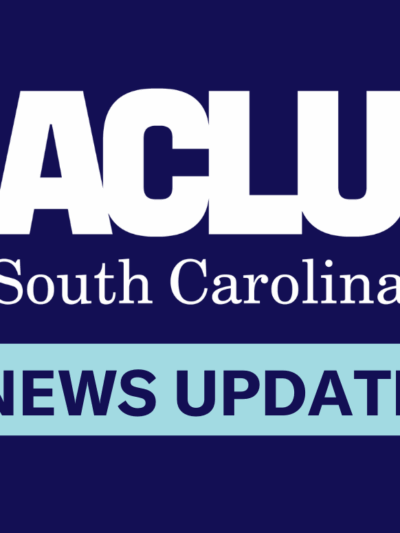
May 20, 2020
"We The People" Means ALL of Us: Our Blueprint for COVID-19 Relief
COVID-19 has illuminated our failures as a society. To urge decision makers to minimize the harms made worse by this pandemic, today we released a blueprint for COVID-19 relief in South Carolina. The blueprint calls on our leaders to ensure the burdens of the pandemic do not unfairly fall on South Carolina’s most vulnerable communities and that all responses are rooted in science and public health and are no more intrusive on civil liberties than necessary. To ensure a COVID-19 response that protects all people, South Carolina must:
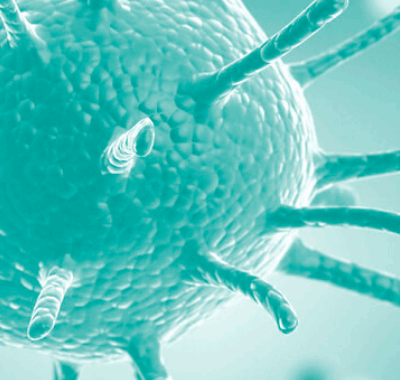
May 08, 2020
South Carolina must ensure equal educational and privacy rights during COVID-19 (and beyond)
While the challenges facing our state and nation during the COVID-19 crisis are significant, they do not relieve South Carolina of its legal obligations. In the education context, those obligations are clear: As the United States Supreme Court wrote in Brown v. Board of Education, “[I]t is doubtful that any child may reasonably be expected to succeed in life if he is denied the opportunity of an education. Such an opportunity, where the state has undertaken to provide it, is a right which must be made available to all on equal terms.”
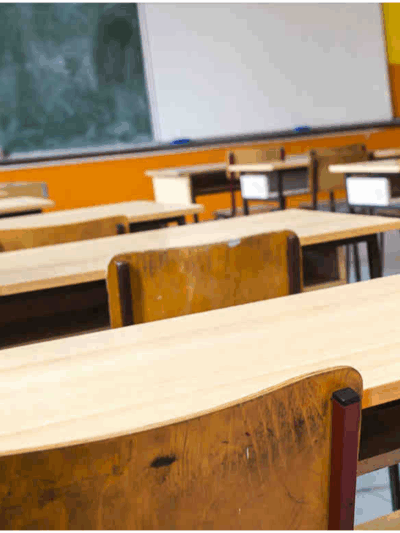
May 06, 2020
A Man in South Carolina Custody Died From COVID-19. Officials Must Uphold Their Duty to Protect Incarcerated People Before It Happens Again.
South Carolina has a moral and legal obligation to protect the people it incarcerates. For weeks we have asked South Carolina officials to uphold this obligation in the face of COVID-19, including releasing those most vulnerable to contracting and dying from this virus. South Carolina officials have ignored their responsibility. The consequences are tragic and predicted. James Slater, a 70-year-old man incarcerated at Allendale Correctional Institution, died yesterday from COVID-19. To be clear, no one in custody should die in connection to abuse or neglect by the state.Mr. Slater’s death was preventable. The rate of recidivism for people over age 65 is nearly 0%, meaning almost all incarcerated people over age 65 pose virtually no threat to public safety. Additionally, there are multiple avenues by which Mr. Slater and other incarcerated people his age or older could have been released to a safer environment ahead of a COVID-19 outbreak. The Director of the South Carolina Department of Corrections (SCDC) has the authority to petition the parole board to release people who are 70 years of age or older. During a state of emergency, the Governor has the authority to do anything necessary to keep people safe. Neither SCDC nor the Governor, we tragically learned yesterday, has upheld their duty to protect.The virus’s ability to spread through asymptomatic carriers has been well-documented. For example, correctional institutions across the country that have issued mass testing have found that as much as 70% of the population of a single institution has tested positive for COVID-19, with a vast majority showing no symptoms at all. Therefore, testing and monitoring only those who are symptomatic is neither a solution nor a good faith effort.It is absolutely essential that those with the authority to act do everything in their immense power to prevent future deaths from COVID-19 in correctional settings. This includes ordering mass testing of all incarcerated people and staff and substantially reducing the number of people held in South Carolina’s prisons and jails.
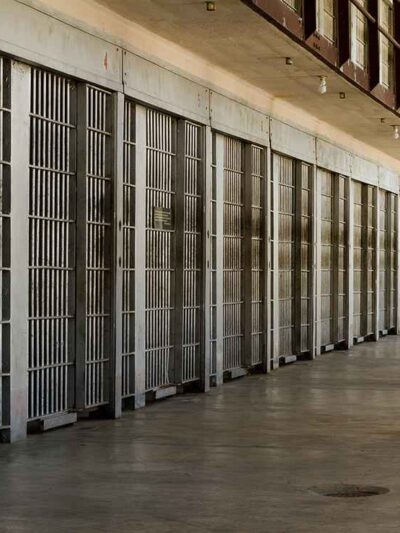
May 01, 2020
We Cannot Let People Lose their Home
From the exploitation of low-wage workers, to the denial of equitable education, to the failure to protect the rights of incarcerated people, COVID-19 has made clear the failings of our society to ensure the basic rights of all.Across the nation, the COVID-19 pandemic has already resulted in widespread and devastating economic consequences. As of last Thursday, over 30 million people have filed for unemployment insurance. And, because health insurance is often tied to employment in our country, the number of uninsured or underinsured people and families in America will increase in the midst of a global pandemic. This is unprecedented and doesn’t include undocumented people who also face additional harms and exploitation.In the face of staggering unemployment numbers and climbing medical costs, millions of people living in the United States -- and 1,473,765 renters in South Carolina -- face the imminent threat of losing their homes. These consequences risk further spread of COVID-19 throughout South Carolina and undermine efforts to protect public health and well-being. Moreover, the nearly guaranteed wave of evictions would inflict far-reaching and significant economic and social harm on thousands of South Carolina residents—particularly on women, people of color, low-income residents, and other vulnerable communities.Last week we sent a letter to Chief Justice Beatty and Governor McMaster urging them to take the steps necessary to prevent South Carolinians from losing their home during a global pandemic. Chief Justice Beatty’s order to halt evictions and foreclosures until May 15 is a welcome step, but our leaders must go much further. It is critical to immediately extend the moratorium period to at least July 25 to align with the federal CARES Act. Furthermore, our state leaders must take steps to provide additional protections to renters and prevent a surge of evictions after the moratorium expires, including halting utility disconnections, establishing rent payment grace periods, prohibiting evictions due to nonpayment of rent during the pandemic, and prohibiting late fees and rent increases.Evictions and utility shut-offs will disproportionately harm communities of color -- and particularly women of color. The ACLU’s Data Analytics team analyzed national eviction data from 2012 to 2016, provided by the Eviction Lab at Princeton University, and found that on average, Black renters had evictions filed against them by landlords at nearly twice the rate of white renters. Women of color, and particularly Black women, bear the burden of eviction. The harmful impact of eviction is further compounded by other racial, gender, and socioeconomic barriers—such as wealth gaps, pay disparities, and inequities in our healthcare system.Critically, the aftermath of an eviction persists for decades, as tenants with prior eviction records face major obstacles to accessing future housing opportunities. Landlords routinely employ screening policies that deny housing to any renter previously named in an eviction case, regardless of whether the case was dismissed, occurred many years ago, or was filed on unlawful grounds. As a result, eviction often exacerbates and reproduces conditions of economic insecurity for low-income women and communities of color.Utility shut-offs also disproportionately harm communities of color. A 2017 report by the NAACP found that Black households experience utility disconnections at a higher rate than financially similar white households. For households at or below 150% of the federal poverty level, only 5.5% of white-headed households experienced shutoffs as compared to 11.3% of Black-headed households. Similarly, another study revealed that residents in neighborhoods predominantly consisting of people of color faced 27% higher energy cost burdens than those in predominantly white neighborhoods. Research further shows that Black communities disproportionately experience higher water costs, water service terminations, and water liens, resulting in negative health and economic outcomes.South Carolina must expand a comprehensive moratorium on evictions, halt utility shut-offs and prevent mass evictions after the moratorium ends. In light of the widespread and devastating impact of eviction during the pandemic, we call on South Carolina to immediately issue a comprehensive moratorium on evictions and utility shut-offs throughout the entire state that prohibits every stage of the eviction process without exceptions for types of tenants or lease violations. South Carolina must also plan ahead for when the moratorium ends to prevent mass evictions and other enduring housing consequences for tenants hurt by the pandemic.Specifically, we call on South Carolina to:
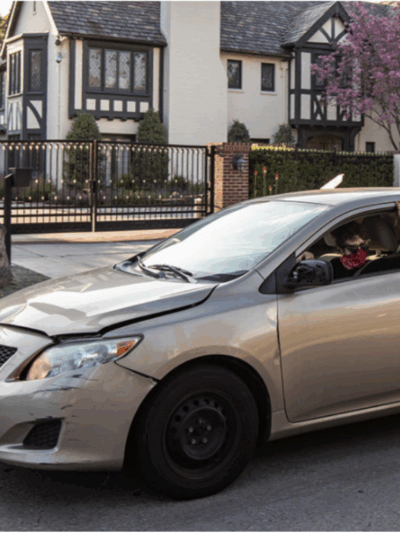
Apr 23, 2020
We're Asking the Courts to Ensure Access to the Vote During COVID-19
On April 22, we and our partners at the nationwide ACLU and NAACP Legal Defense and Educational Fund filed a federal lawsuit over South Carolina’s failure to take action to ensure all eligible voters can vote by mail during the COVID-19 pandemic — even for our fast-approaching June 9 statewide primary elections.We are challenging a state requirement that forces people who vote absentee to have a third-party witness signature on their ballot envelope, as well as an “excuse” requirement that fails to provide an accommodation to allow all eligible voters to vote absentee during the pandemic.Even if voters are allowed to vote absentee “because of injury or illness” that keeps them at home, election officials have rejected the view that this currently “include[s] self-isolating due to a pandemic.”Requiring voters to be physically present at their traditional polling places during the COVID-19 outbreak — where they will be congregating and waiting in line with others in order to vote — is contrary to the advice of public health experts. In addition, in the midst of a pandemic, the witness requirement also puts people’s health at risk.Our lawsuit asks the court to block the state from enforcing the requirements while COVID-19 transmission is occurring; issue guidance instructing local election officials to count otherwise validly cast absentee ballots that are missing a witness signature for South Carolina’s primary and general elections in 2020; and conduct a public information campaign informing voters about the elimination of the witness and excuse requirements at this time.Inevitably, the COVID-19 pandemic will result in voter suppression in 2020 elections unless we put preventative measures into place now. Without action from the courts, South Carolina’s June primaries will force people to choose between their health and their right to vote, a decision no one should have to make.
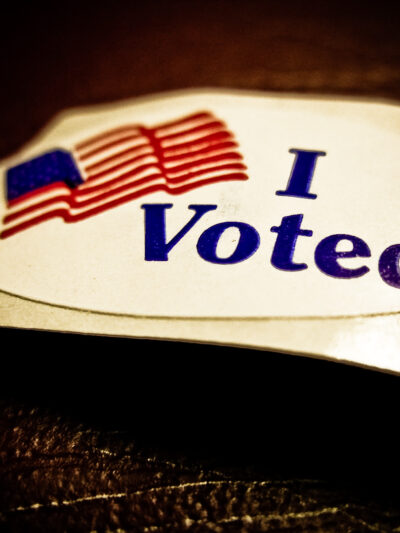
Apr 22, 2020
Nearly 100,000 more people could die from COVID-19 in jails and surrounding communities if states fail to reduce jail populations. The time to act is now!
South Carolina’s jails and prisons alike have too often become our society’s solutions for people struggling with homelessness and mental health or substance use disorders. Our jail and prison logs are a daily reminder that our criminal justice system is a racist system that stops, arrests, convicts, and incarcerates Black people at staggering rates compared to white people.With COVID-19, our failings as a society leave each of the nearly 30,000 people incarcerated in South Carolina’s prisons and jails facing a potential death sentence. That’s because incarcerated people are highly vulnerable to contracting and dying from COVID-19. They are housed in close quarters and are often in poor health. It is impossible for them to follow the social distancing guidelines.For weeks, public health experts have been urging policymakers to do everything in their power to substantially reduce prison and jail populations to safeguard the lives of those who work and live there. The findings outlined in a new report released today by the ACLU amplify the need to reduce South Carolina’s jail populations immediately.The report focuses on a new epidemiological model that shows COVID-19 could claim the lives of approximately 100,000 more people nationwide than current projections stipulate if jail populations are not dramatically and immediately reduced. These projections hold even if communities across the United States continue practicing social distancing and following public health guidance.South Carolina’s unfortunate embrace of mass incarceration makes this problem even more dire. We’re talking about approximately 10,000 people in South Carolina’s jails alone.Here are three things that our judges, solicitors, law enforcement, and local political leaders can do immediately to substantially reduce South Carolina’s jail population.First, review all people currently held pretrial and immediately release on a personal recognizance bond all but the very few people where pretrial detention is absolutely necessary to ensure the person’s return to court or public safety. Approximately 75 percent of the over 10,000 people in South Carolina’s jails are incarcerated only because they are too poor to afford their bond. These people have not even been convicted of a crime.Second, end the war on marijuana. As we reported on Monday, South Carolina has the second highest rate of marijuana possession arrests in the country. Every 15 minutes somebody is arrested for possessing marijuana in South Carolina - a substance that is legal or decriminalized for personal use in 26 states and the District of Columbia. As we work toward the legalization of marijuana statewide, our local leaders, from solicitors, to city and county leaders, to police chiefs and sheriffs, can immediately stop enforcing South Carolina’s marijuana possession laws. That’s a reduction of around 34,000 arrests each year.Third, prohibit the use of arrests unless necessary to prevent imminent and serious bodily harm to another person and all non-incarceration alternatives have been exhausted. This would not only reduce unnecessary incarceration, but also strengthen trust in law enforcement - a key component to advancing public safety. As the Vera Institute of Justice noted, in “communities where distrust in police is high, people are less likely to report a crime or offer witness testimony, which impedes effective policing.”For weeks we have asked our South Carolina’s political leaders to listen to the experts and take immediate steps to reduce our incarcerated populations. Our political leaders are running out of time, as we saw yesterday moments after we, along with our pro bono partners at Arnold and Porter, filed a lawsuit seeking the release of people at heightened risk of contracting and dying from COVID-19 in South Carolina’s prison system. Shortly after we filed the lawsuit, the South Carolina Department of Corrections disclosed that a second incarcerated person tested positive for COVID-19 at Kirkland Correctional Institution, leading to a two-week lockdown at the facility. Because Kirkland is the facility where all newly sentenced people come before being sent to another prison, the Department of Corrections has announced that it will not take newly sentenced people for two weeks, leaving additional people warehoused in South Carolina’s jails until Kirkland opens again.As the new ACLU model found, aggressive action and policy change could save as many as 23,000 people in jail and 76,000 in the broader community if we stop arrests for anything but the five percent of crimes defined as most serious by the FBI — including murder, rape, and aggravated assault — and double the rate of release for those already detained.Incarceration should not become a death sentence. The ACLU model shows that a larger catastrophe can be prevented if governors and all system stakeholders drastically reduce their incarcerated populations.We cannot do this alone. Your voice can make a difference. Please click this link to learn how you can take action!

Apr 21, 2020
We're Suing for Release of Incarcerated People Most Vulnerable to COVID-19
On April 9, we sent a letter calling on Governor McMaster to immediately mandate a prison reduction plan and protect incarcerated people from the perilous risks associated with COVID-19 in correctional settings. Despite the recommendations of public health experts and pleas from concerned advocates and loved ones of incarcerated people, Governor McMaster has continued to neglect his duty to care for people in custody -- including those who are most at risk of becoming critically ill or dying from COVID-19. We're suing to prevent death by incarceration. Along with our pro-bono partners at international law firm Arnold & Porter, we filed a federal lawsuit this evening against Governor Henry McMaster, South Carolina Department of Corrections Director Bryan Stirling, and members of the South Carolina Board of Pardons and Paroles. Protection and Advocacy for People with Disabilities, Inc. (P&A) also joined the lawsuit as a plaintiff on behalf of incarcerated people with disabilities.

Apr 19, 2020
It's Time for South Carolina to Change its Marijuana Laws
A new ACLU report released today documents how South Carolina’s marijuana laws needlessly ensnare tens of thousands of people -- disproportionately Black people -- in its criminal justice system every year. Sold to the public in the name of public safety, these laws do not make us safe and ruin lives.South Carolina has the second highest arrest rate for marijuana possession in the United States. Every 15 minutes somebody is arrested for possessing marijuana in South Carolina - a substance that is legal or decriminalized for personal use in 26 states and the District of Columbia.South Carolina’s current marijuana laws are a monumental waste of tax dollars. For each of the 34,229 marijuana arrests in 2018, our tax dollars had to pay for a judge, a clerk, law enforcement officers, solicitors, and others to process the case. According to an economic analysis published in 2013, the 16,669 marijuana possession arrests in 2010 cost South Carolina taxpayers nearly $50 million. Between 2010 and 2018 the number of marijuana possession arrests more than doubled, meaning South Carolina taxpayers may be paying closer to $100 million each year to enforce outdated and harmful marijuana possession laws.South Carolina’s marijuana policy is another example of its two-tiered justice system. Two people can be arrested for possessing the same amount of marijuana and face vastly differing punishments based on nothing more than their wealth. This is because access to diversion programs, which can mean the difference between having a criminal conviction and a clean record, often require fees to participate. As a result, those with wealth can pay their way to a clean record, while those without wealth are stuck with a criminal record and all of its collateral harms.And, South Carolina’s marijuana laws, like all aspects of its criminal justice system, are enforced with a staggering racial bias. In 2018 Black people were 3.5 times more likely to be arrested for marijuana possession when compared with whites, despite both groups using marijuana at roughly the same rate. And, this disparity is on the rise, up from 1.8 times more likely to be arrested in 2001 to 2.8 times more likely to be arrested in 2010. The discriminatory enforcement of South Carolina’s marijuana laws means that Black people are more likely to face the immediate harms of a marijuana possession conviction, including potential incarceration, criminal records, the loss of jobs, housing, financial aid eligibility, and child custody.The discriminatory enforcement also compounds the harms that already exist because of the racial wealth divide - a divide born from slavery and maintained though racist policies including regressive taxation, lending and pay discrimination, and unequal education, to name a few. White families in the United States have a median household wealth of $171,000 while Black families median household wealth is just $17,600. Because of this vast economic inequality, the reduced ability to participate in a diversion program and the collateral harms of a marijuana conviction, including its associated fines and fees, disproportionately push Black people into cycles of never ending debt, poverty, and further contact with the criminal justice system.It’s time for our communities to define and advance our vision for what a just, equitable, and safe South Carolina should look like. And, part of this vision must be the legalization of marijuana with racial equity at the foundation of such reform.
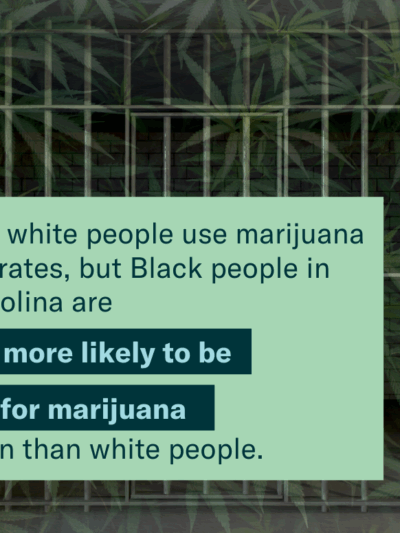
Stay Informed
Sign up to be the first to hear about how to take action.
By completing this form, I agree to receive occasional emails per the terms of the ACLU’s privacy statement.
By completing this form, I agree to receive occasional emails per the terms of the ACLU’s privacy statement.
